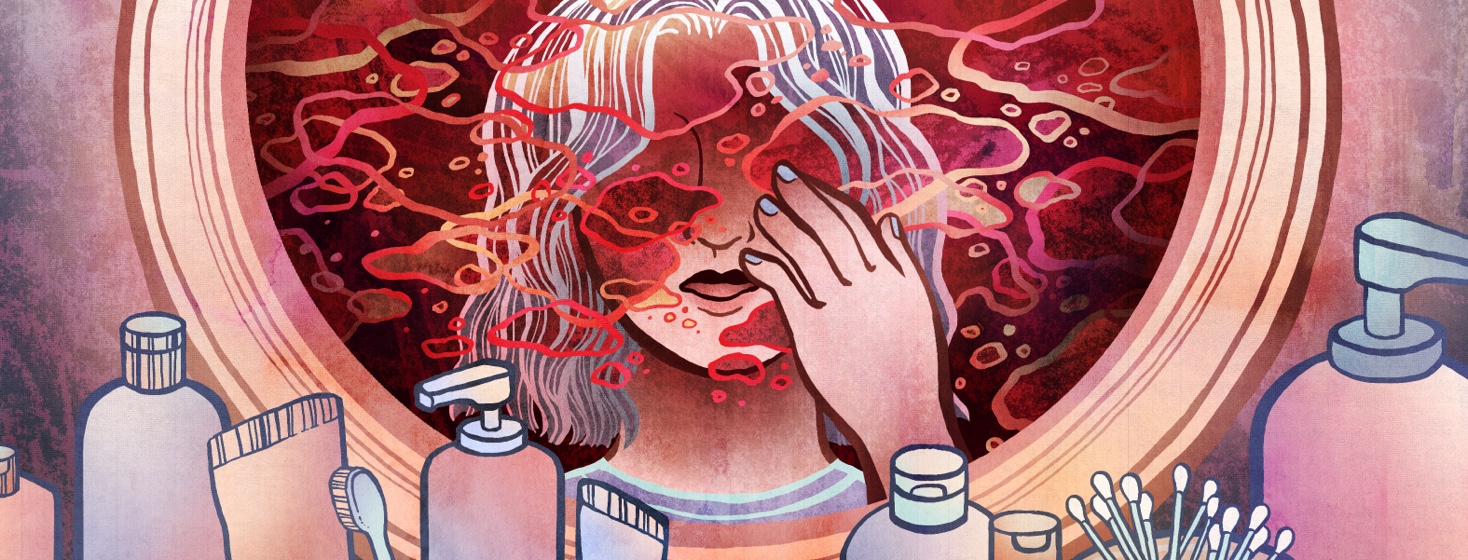I Don't Look In the Mirror Anymore
The worst days are the ones when I go see my doctor because the fluorescent lights show me how bad my skin really is.
Why have I felt I've been on display?
I'm in a clinical trial for a drug that should reduce my eczema but may or may not reverse my topical steroid withdrawal. Every few months, they hand me a paper thong and take pictures of every part of my body. I try to look anywhere except down or at the doctors, meticulously cataloging every scab, every gash, every flake of me. In a clinical trial, you are specimen first, patient second.
What does each doctor's visit remind me of?
I'm reminded every visit that I have the worst eczema any of my doctors have ever seen. They talk to me like I'm a dying puppy. They fawn over my every possible discomfort and desire in the moments between photos, biopsies, and injections. Do you need water? Is the temperature in here alright?
How does the clinical trial remind me of the severity of my skin?
We used to tell each other jokes and talk about our families, our vacation plans, our hobbies. But there is a point past which even doctors struggle to know how to interact with a sufficiently sick person because the only thing in a sick person's world is their illness. If you're in a clinical trial, you're there because your needs have surpassed the limits of your doctor's ability to care for you. When things get worse instead of better after the first four months, your doctor can only reassure you that you're probably in the control group. Things will get better when you start getting the drug during the next phase. Hopefully.
How have I been hiding my eczema flares?
I spent last summer wearing jeans and a jacket with a large collar because I discovered quickly that if I'm going to get strange looks on my way to and from appointments, I'd rather them be for my fashion choices than for my disease. Since September, I don't get any looks at all with my mask on. As long as other people can't see my skin, it might as well be good.
When I get home, my jacket goes straight in the washing machine, or the thick, yellow ooze that's coated a third of the collar will harden and stain.
Do I feel this uncomfortable with my fiancée?
I'm fortunate that I don't have to leave my apartment except for these monthly visits. I have a loving fiancée who runs all our errands and doesn't look straight at me when I ask her not to. I don't know that I would be able to look at her the way she still looks at me if our roles were reversed, so I'm glad they're not, but I have a hard time believing her when she says I don't repulse her. I wonder if that makes me a bad partner or if I'm just particularly sensitive to these things. I wonder if going through it made me particularly sensitive or if that comes from somewhere else.
Why was watching TV hard?
For the first month or so after things got really bad, I couldn't even watch TV. Watching beautiful, able-bodied people do literally anything felt like a personal insult. I read somewhere that chronic illness makes you viscerally aware of your body's limitations even as it alienates you from it. What space does that leave me to exist?
Does not looking in the mirror help?
Now that my face is going through it, I'm not looking in any mirrors. I'm not in denial. I know what I look like—that's why I don't look. Staring directly at the festering reality of my body sets off my anxiety, and my anxiety makes me scratch. Scratching sets off my anxiety, too. So you can see how catching a glimpse of the giant, yellow scab on my upper lip and the open wound that is my neck and the right side of my face in the bathroom mirror can end with me weeping on the couch, tangled in the sheets I lay down to protect the upholstery from my flaking and oozing, covered in blood.
It's just easier to keep the lights off.

Join the conversation